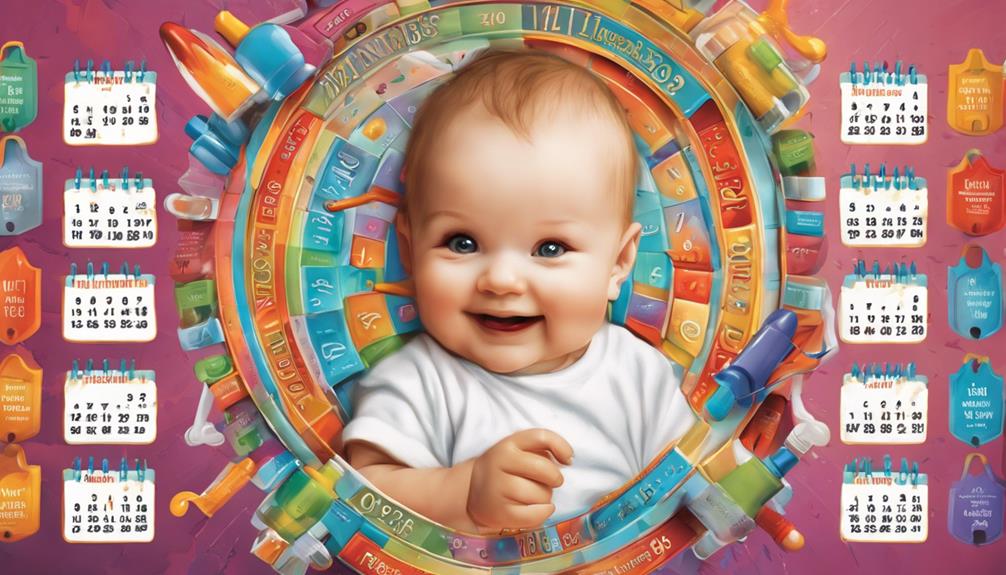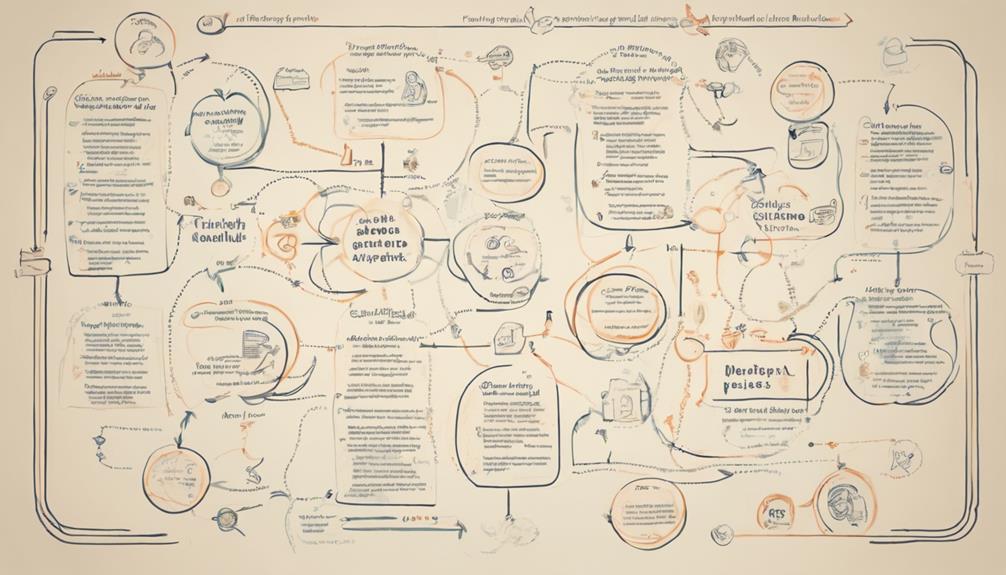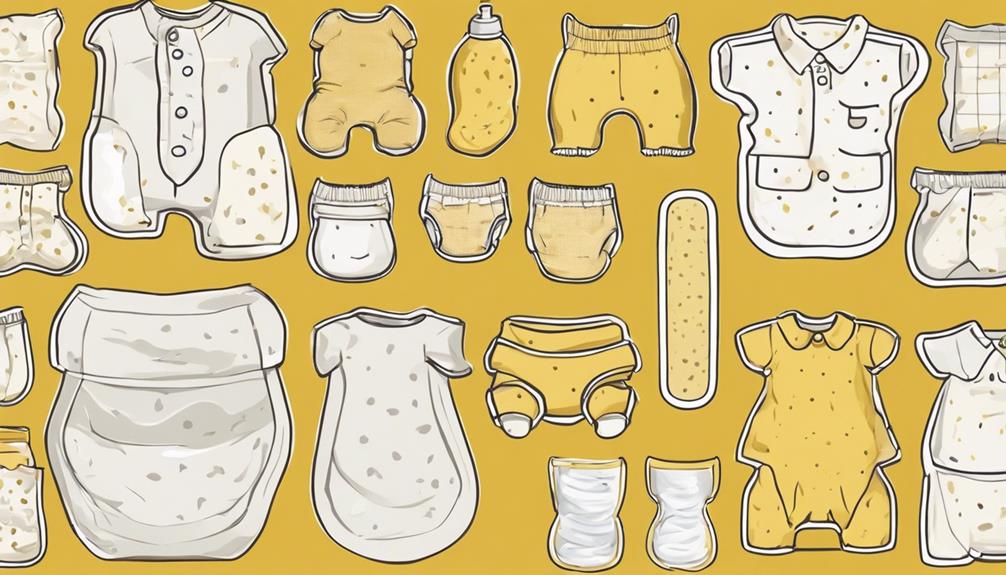As new parents, we often underestimate the importance of providing proper care for our newborns. Were you aware that newborns need about 16 to 17 hours of sleep per day for their healthy development?
Understanding the essentials of a care plan is key to providing the best start for your little one. From feeding schedules to vaccination timelines, each aspect plays a critical role in their well-being.
Let's explore the intricacies of creating a all-encompassing care plan that can set the foundation for a lifetime of health and happiness.
Key Takeaways
- Establish a feeding schedule and monitor weight gain for proper nutrition.
- Introduce bedtime routines for quality sleep and develop nap schedules by 9 months.
- Practice good hygiene, care for the umbilical cord, and prevent diaper rash.
- Ensure timely vaccinations, monitor developmental milestones, and seek prompt intervention for delays.
Feeding Schedule and Nutritional Needs
In caring for your newborn, we must establish a feeding schedule that aligns with their nutritional needs and growth requirements. Whether you choose to nourish your little one with breast milk or formula, both offer important nutrients necessary for your newborn's development. Breast milk, in particular, provides essential antibodies and immune support that can bolster your baby's health.
To guarantee proper hydration, it's important to monitor your newborn's feeding frequency. Typically, newborns feed every 2-3 hours, totaling about 8-12 times a day. Adequate fluid intake can often be gauged by the number of wet diapers your baby produces. Additionally, keeping an eye on your newborn's weight gain is key to ensuring they're thriving and receiving enough nutrition.
Should you have any questions or concerns regarding your newborn's feeding schedule, don't hesitate to reach out to a healthcare provider or lactation consultant. These professionals can offer valuable guidance on feeding techniques and address any worries you may have about your newborn's nutrition.
Sleep Patterns and Routines

Establishing consistent sleep patterns and routines is essential for supporting your newborn's growth and development. Newborns require around 16-17 hours of sleep a day to aid their development.
Room-sharing, without bed-sharing, is recommended to reduce the risk of Sudden Infant Death Syndrome (SIDS). Creating a bedtime routine helps your baby anticipate and adapt to sleep patterns.
As your newborn reaches around 5 months, gentle sleep training methods can be introduced to assist with sleeping through the night. By 9 months, most babies naturally develop a nap schedule, often napping around 9 a.m. and 2 p.m., aligning with their sleep needs.
These routines promote healthy sleep habits and aid in your baby's overall well-being. Remember, each baby is unique, so it's important to be patient and attentive to your little one's cues as you establish a comforting and effective sleep routine.
Hygiene and Skin Care
To maintain your newborn's hygiene and skin health, daily cleaning of the genital area with warm water is essential. Here are some key tips to guarantee your baby's skin remains healthy and free from common issues:
- Care for the Umbilical Cord: Keep the umbilical stump clean and dry until it naturally falls off, usually within one to three weeks. Clean the area around it with warm water and mild soap, and make sure it's exposed to air to aid the healing process.
- Preventing Diaper Rash: Change diapers frequently and use gentle baby wipes or warm water to clean the diaper area. Applying a barrier cream can help prevent diaper rash, and giving your baby some diaper-free time can also aid in keeping the skin dry and healthy.
- Dealing with Cradle Cap: If your newborn develops cradle cap, gently massage their scalp with baby oil to help loosen the scales, and then wash their hair with a mild baby shampoo a few times a week. Avoid picking at the scales to prevent irritation and infection.
Vaccination Schedule and Immunization

Let's explore the critical importance of maintaining a timely vaccination schedule and making sure proper immunization for your newborn. Immunizations play a vital role in safeguarding your baby's health by providing protection against serious diseases like hepatitis B, polio, and tetanus. By following the CDC's recommended vaccination schedule, you not only enhance your newborn's immunity but also contribute to preventing the spread of vaccine-preventable illnesses in the community.
It is important to have open discussions with your healthcare provider about any concerns or queries regarding vaccinations. Your provider can offer valuable insights to help you make well-informed decisions about your newborn's health. Remember, vaccines undergo thorough testing to ensure they are safe and effective for newborns. Prioritizing your baby's immunization is a proactive step towards promoting their well-being and the health of those around them.
| Vaccination Schedule | Benefits |
|---|---|
| Timely immunizations help protect against serious diseases | Boosts newborn's immunity |
| Prevents outbreaks of vaccine-preventable illnesses | Safeguards community health |
Developmental Milestones Monitoring
Monitoring your newborn's developmental milestones is essential for tracking their progress in key areas of growth and development. By observing these milestones, caregivers can identify any delays or concerns early on, allowing for timely interventions and support.
Here are three important aspects to take into account when monitoring your newborn's developmental milestones:
- Key Areas: Keep an eye on motor skills, communication abilities, social interactions, and cognitive development to make sure your newborn is progressing as expected.
- Identifying Delays: If you notice any delays in reaching milestones like lifting the head, making sounds, or grasping objects, consult with a healthcare provider promptly for guidance on interventions.
- Caregiver Support: Regular monitoring not only helps in tracking growth but also equips caregivers with insights to promote the best possible development and overall well-being in their newborn.
Frequently Asked Questions
What Is the Essential Care of a Normal Newborn?
We guarantee immediate assessment post-birth for your newborn's well-being. Apgar scoring at 1 and 5 minutes helps evaluate important signs. Physical exams are important for early detection of issues. Our care plans focus on nutrition, warmth, and development.
What Are the 4 Basic Needs of a Newborn?
We grasp the importance of meeting the 4 basic needs of a newborn: warmth, nutrition, sleep, and protection. These essentials are crucial for their well-being and development. Let's make sure we provide the best care for our little ones.
What Are the 5 Steps of Newborn Care?
We assess the baby's condition, score Apgar, conduct a thorough exam, provide immediate care, and guarantee postpartum care. These steps are important for identifying and addressing any immediate concerns, promoting the well-being of the newborn.
What Is the First Step in Essential Newborn Care?
The first step in essential newborn care is conducting a thorough assessment to confirm the baby's well-being. Apgar scoring at 1 and 5 minutes assesses health status, focusing on immediate respiratory evaluation and physical examination for timely intervention and proper care.
Conclusion
In implementing our essential care plan for newborns, we prioritize their well-being with a focus on feeding, sleeping, hygiene, vaccination, and developmental milestones.
By following this holistic approach, we create a nurturing environment that promotes growth and development.
Let's make sure we give our little ones the best start in life by staying proactive and consistent in providing essential care for their best health and well-being.









